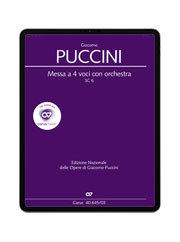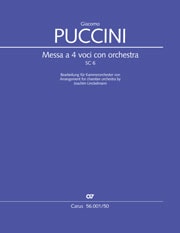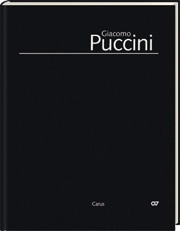Musically prayers
Music, Italy, wine … anyone who loves all these things shouldn’t miss Puccini’s Messa a 4 voci con orchestra (Messa di Gloria). Puccini was occasionally criticized for composing “simply”, yet it is often forgotten how long he struggled with subject matter. Despite this the Messa di Gloria is a work which any choral director is grateful for.
Music, Italy, wine … anyone who loves all these things shouldn’t miss Puccini’s Messa a 4 voci con orchestra (Messa di Gloria). But is it a mass? As a Protestant from Saarland, this operatic-style sacred music initially surprised me, but I have gone on to perform the work many times with enthusiasm, including in the Philharmonie Cologne, the Altenberger Dom, and even in Israel!
As a 15-year-old I visited Lake Garda with the Jugendkantorei der Pfalz, and of course the program of events included a visit to the Arena in Verona – my first contact with opera, and even better, it was Verdi’s Aida and Bizet’s Carmen. Overwhelmed by these impressions I felt drawn towards this music and wanted to learn more about it. The young Puccini too was impressed by the old master Verdi and was inspired by his ideas of orchestration.
The lightness and vitality, as found at the beginning of the Gloria in particular, is really catchy and already shows the subtlety of his later operas, some of which also quote themes from this mass. Alongside this there are also profound sections, such as the Crucifixus, which makes a deep impression in the operatic portrayal by the bass solo. and fulfils a dramatic function entirely befitting the text before the chorus allows the well-known sounds to be heard again in the Et resurrexit.
Puccini was occasionally criticized for composing “simply”, yet it is often forgotten how long he struggled with subject matter, how much thought he gave as a 19-year-old to new developments in music, and how demanding even this early mass setting is for the choir. Despite this the Messa di Gloria is a work which any choral director is grateful for: with the singers you can feel the joy of really being able to sing out from the very first rehearsals, and when they are joined by the orchestra this results in a brilliant sound which the soloists simply slot into. After a musical experience like this, the audience can hardly do anything other than continue the exuberance they have just absorbed over a glass of wine and conversation about the finer things of life.
Of course not every choir can perform with a symphony orchestra, but the reduced version for chamber orchestra (CV 56.001/50) also offers an optimal balance between transparency and orchestral sound, whilst retaining the symphonic character of the work.
Until 2014 the church musician and choral director Volker Hempfling conducted the Kölner Kantorei, which he founded in 1968. In 1983 he became director for the Gürzenich Choir in Cologne. He was Music Director and Cathedral Organist at the Altenberger Dom from 1972 to 1979. For 25 years Hempfling was Professor of Choral Conducting at the music conservatoires in Saarland and Düsseldorf. He is active as a music educator and jury member of several choral competitions and also editor of choral collections at Carus.



 The Messa a 4 voci was composed by the 22-year-old Giacomo Puccini at the end of his schooldays, and revised about 15 years later. Even in this early work, the subtlety of writing found in Puccini’s later operas is clear, works in which he re-used some themes from the mass.
The Messa a 4 voci was composed by the 22-year-old Giacomo Puccini at the end of his schooldays, and revised about 15 years later. Even in this early work, the subtlety of writing found in Puccini’s later operas is clear, works in which he re-used some themes from the mass. 
 The works of Giacomo Puccini will be presented in a scholarly critical edition. Upon petition to the Italian Ministry of Culture by the “Centro Studi Giacomo Puccini,” the institute responsible for this edition, the project has been recognized as an “Edizione Nazionale.” It receives a significant amount of its support from the Ministry.
The works of Giacomo Puccini will be presented in a scholarly critical edition. Upon petition to the Italian Ministry of Culture by the “Centro Studi Giacomo Puccini,” the institute responsible for this edition, the project has been recognized as an “Edizione Nazionale.” It receives a significant amount of its support from the Ministry. 
Leave a Reply
Want to join the discussion?Feel free to contribute!